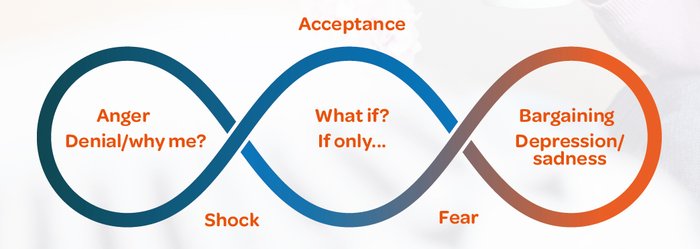What does a diagnosis of CKD mean?
CKD is divided into five stages.
Most people with mild CKD (stages one to three) manage the condition themselves with support from their GP.
Moderate to severe CKD (stages four to five) is likely to involve specialist kidney care.
Only around one in 50 people with CKD develop kidney failure and need to have dialysis and/or a kidney transplant.
Talk to your GP about your individual situation and what, if any, treatment is needed.
I’ve just been diagnosed with CKD. What happens now?
Most people are creatures of habit: we have our preferred way of living our life, with free choice over how we spend our time.
Finding out you have moderate or severe CKD can have a big impact on your life and you may feel that your choices and freedom are now limited.
On the other hand, you may be relieved that you have a diagnosis, so that you know what has been making you unwell and can discuss treatment options with your doctor.
You may feel overwhelmed by all the information you are given, especially if the diagnosis was unexpected.
Understanding your feelings is the first step to taking care of yourself and identifying what support you need. There is no set timeframe for this. You should give yourself as long as you need to process everything.
You may not need to make any big changes straight away. For example, not everyone who is diagnosed with moderate or severe CKD needs to have dialysis or a transplant. Your kidney team will talk you through your treatment options.
It is important to take time to think about what the diagnosis means for you, your family and your lifestyle.
The emotional journey
Coming to terms with a diagnosis of CKD is like going on a roller coaster – there are ups and downs, and some days you may feel like you are going backwards. Everyone’s journey is different, but the diagram below shows some of the emotions you might feel.

You may never reach a state of full acceptance of your diagnosis and will likely bounce between different emotions. This is natural and it is important to take as much time as you need in each stage.
The physical journey
Coming to terms with a diagnosis of CKD can have physical side effects, on top of those you already experience because of your condition.
These may include:
- difficulty sleeping
- loss of appetite
- lack of energy
- low mood
- anxiety
It is important to talk to your doctor if you are affected by any of these issues. It is normal to feel stressed after receiving a potentially life- changing diagnosis.
How you cope with that stress will have a big impact on all areas of your life.
What support is available for me?
The shock of receiving a diagnosis can stop you from taking in all the information you are given. It is important to take time to think about what you have been told. Ask your doctor or nurse to repeat or clarify something if you don’t understand.
It may help to take notes in your appointments so you remember what your kidney team tell you. You can also ask them to give you some written information that you can read in your own time when you are away from the potentially stressful medical environment.
There may be practical things to think about such as work, travel and financial considerations. Talk to your medical team about any concerns you may have. They can give advice, or point you in the direction of further specialist support.
Kidney Care UK offers free specialist renal counselling to everyone affected by kidney disease, as well as access to a Patient Support & Advocacy Service. To speak to someone about your diagnosis and for more information about welfare and benefits, treatment options and travel advice, call our Support Line at 0808 801 0000.
Your family and friends will also be feeling a lot of the same emotions, but may be afraid to discuss them for fear of upsetting you. Talking to them can help reduce worries on both sides.
You may like to involve a family member or friend by inviting them to some of your doctors’ appointments so they can ask their own questions. This will save you from having to explain things to them and can help them to feel more involved.
Where do I go from here?
Knowledge is power. Understanding your condition can help reduce worries and allow you to make an informed decision about your treatment.
Being diagnosed with moderate or severe CKD is likely to have a big impact on your life, but it is still your life and kidney disease is just one aspect of it.
The main thing to remember is that you are not alone and there is support available if you need it.
Where can I find more information?
Your kidney unit may have a dedicated psychologist or counsellor that you can speak to. Ask your kidney team or GP for a referral to specialist support if you feel this will help.
You can also get support from Kidney Care UK.

Publication date: 12/2023
Review date: 12/2026